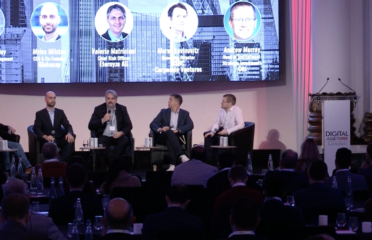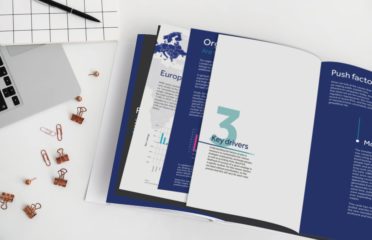Promoting diversity in leadership and decision-making

As we mark International Women’s Day 2024, we explore this year’s themes of investing in women and of inspiring inclusion.
One of the key pillars of both themes is the promotion of diversity and inclusion in leadership and decision-making positions. So we spoke with members of our leadership team, to share their thoughts on what is important to women in our organisation to feel included and valued. Essentially, what do they see as actually important in practice, in terms of behaviours, structure and work culture? Thanks to our contributors Hayley Castiglione (Vice President – People), Tricia Weener (Consultant), Joanna Tibbitt (COO), Myles Milston (CEO) and David Orr (CTO).
How can organisations best promote inclusivity for women, particularly in Finance and Technology?
Joanna: Being conscious in the make-up of teams and challenging where it isn’t balanced (either way). Whilst it may not be quick to change the composition of the team, if there is an imbalance, it’s important to be aware of this and actively encouraging different voices to contribute. Also, ensuring that team events and discussions deliberately consider the different people involved and making sure they don’t exclude anyone (for example, by being too cliquey, or too focused around drinking or a specific interest).
Tricia: There are several ways that organisations can promote inclusivity, my top five would be:
- Having female role models in leadership positions and on the Board that actively demonstrate the opportunity to progress to the highest levels within finance and tech.
- Active leadership including communications and actions which demonstrate inclusivity from the leadership team and Board.
- Sharing case studies of truly inclusive behaviours and encouraging people to talk about these openly as part of team meetings. Equally, positively share examples where inclusivity has not been demonstrated to help people develop.
- Implementing employee resource groups for less well represented groups (including women), as safe spaces for them to come together and share experiences.
- Having training and development resources available on Diversity, Equality and Inclusion (‘DEI’), to help drive understanding of why it is important and how to help be a changemaker within the business.
This year’s International Women’s Day theme is #InspiringInclusion, what does this mean/look like for you?
Joanna: Inclusion is key in making any diverse organisation successful. Diversity (of any lens, especially of thought) is not useful if it does not have a voice. Inclusion is what brings the diverse voices to be heard.
As humans, we naturally are drawn towards our “in groups” – those who are like us and have similar viewpoints as us. Whilst this might be the most comfortable, it does not lead to the best outcomes for a business (or society) if people outside this group don’t feel included and able to contribute. Most people are quite aware of the dangers of group think, which un-diverse teams can be particularly prone to.
Inclusivity is something that should be a conscious consideration, especially by leaders, to ensure that everyone in the team has the opportunity to make the most of their skills and confidently contribute to the business. It strongly affects whether or not someone feels like they belong and their desire to be part of the success of the team. It takes effort to make sure that the sometimes quieter voices are listened to and their inputs valued as much as those from the “in group”.
Tricia: To inspire inclusion, leaders must create safe spaces for people to be open and transparent about their experiences – both positive and negative. This includes actively seeking to hear from more voices, particularly those that tend to be less extrovert and from less well represented groups.
It’s also important to create a positive feedback culture, so people can learn and develop around inclusive behaviours and actions.
Do you think there’s been a shift in women working in finance and tech? What motivated you to move into this environment?
Joanna: I started out in banking, which was itself quite male dominated, particularly on the corporate banking side of the business. I was quite frequently the only woman in meetings, whether with clients or internally. I definitely didn’t think that I would move to a technology business as it’s not something I’d focused on through my education. However, through various roles I was exposed to the technological and operational side of the business which made me recognise how much relied on technology and the importance of the connection with the front-line business in how this was being built. All banks are technology driven organisations these days (with the overlay of being regulated businesses) so the move was less stark than it might be perceived.
There are definitely more women now in senior roles in both finance and technology than when I started my career (a while ago!) but there is still not a balance. It seems female CIO/CTOs are still quite rare, although I have worked with some excellent ones.
Tricia: I’m not sure I have seen a big shift even in recent years. I like the fact that finance and tech organisations now have targets to ensure they are more representative of the population they serve, but progress hasn’t been quick enough and there is still a long way to go.
When I started my career, the last place I thought I would work was one the largest global banks in the world (HSBC) – in fact, I remember thinking I really wasn’t interested in Financial Services! However I joined HSBC because of the global nature of the business and the potential to live and work overseas, the focus on brand and understanding its importance to growth, and the customers I wanted to be able to support expanding their businesses.
What challenges have you faced, as a woman, entering this industry?
Joanna: It can be hard, particularly as a young woman (especially if you look young), to make an impact and it can feel like you have to work extra hard to prove your credibility to earn the chance for your voice to be heard. There have been plenty of times where I have felt it is difficult to get my voice heard and have been spoken over, however some of this improves with experience as well as building confidence. It is interesting that having worked in Asia, whilst still at times very patriarchal, the hierarchical approach can mean as you get more senior, regardless of gender, you are given more respect and people listen to your ideas. In fact, that can sometimes be frustrating when you want to hear ideas from others!
Tricia: This industry was very male orientated when I joined 13 years ago and, sadly, that’s still the case today. Although I feel there have been improvements made, particularly amongst women in senior leadership positions through the setting of targets and very focused recruitment policies/approaches.
My experiences have led me to take a keen interest in DEI personally and become a changemaker around female diversity and LGBTQi.
What were some key experiences that supported your professional development?
Joanna: I have had excellent mentors and sponsors throughout my career. These have often been men (given it’s finance) and they have encouraged me to be ambitious and confident. I have also had coaching at several points during my career, which has helped me work on my own resilience and inner self talk, which can at times be the biggest obstacle. It has also helped me refine how I come across in discussions with more senior colleagues. I have learned a lot by being exposed to senior levels of discussion and learning by observing their interactions. This is something I worry about for young people starting their career if we don’t get the right balance of in person and remote work for them to learn by picking up cues on how to be effective from those around them.
Tricia: The most significant thing for me has been mentors/coaches and sponsors throughout my career and actively seeking out and creating space for development. Some of my learning experiences include The Marketing Academy Fellowship, HSBC Group Talent Pool, HSBC Sustainability Leadership programme and an Imperial College London Sustainability Leadership Course .
I live by the quote “don’t be a know it all. Be a learn it all.” Satya Nadella, CEO, Microsoft. I am highly curious and prioritise/create space for continual development.
Do you have a woman who inspires you most and why?
Joanna: One who I have recently been impressed by is Amanda Blanc, CEO of Aviva. Having heard her in various interviews, she comes across as a very impressive woman, without having to necessarily lose/hide her feminine qualities of empathy and nurturing the next generation.
When I first started working, the most successful women tended to be those who had become more masculine in their behaviours to compete with the men. Now it feels like there is a better balance where feminine qualities are appreciated for success in both men and women and the appreciation of what good leadership looks like has evolved to be something I would aspire to.
Tricia: Personally, my mum and grandma have been two very strong women who have and do inspire me, along with my daughter.
I would also have to say Michelle Obama for her tireless work for the most needy in society, being a role model mum and an inspiring leader for women of colour everywhere.
How do you think we can encourage employment of women in Tech?
Joanna: We need to profile successful women more to normalise the career route. We should highlight our culture to attract women, which also includes the flexibility and benefits we are able to offer. Whilst a big focus still remains on STEM subjects in education to attract the pipeline of young women interested in tech careers, highlighting the focus on problem solving, analysis and design can help make roles seem less intimidating.
Tricia: We need to actively talk about our roles and what we love about working in tech. Firms should mentor/coach young women in our tech businesses to support their growth. They should adopt recruitment and succession policies that actively support women getting into the industry. Also, this all needs to be implemented alongside observable targets, so firms have a goal and can demonstrate progress.
Hayley: We have been and are also actively encouraging our recruiters to source more women in our organisation, particularly in the technology and engineering space, and it’s proving a real challenge. What we have found, and from the feedback shared from those recruiters we work closely with is that there aren’t enough women in engineering with the back-end languages and skills that we need for our roles; though there is better representation on the front-end of engineering. To reiterate the thoughts of others, encouraging and investing in more women into technology starts with education; providing young women with the understanding of what opportunities are available to them, encouraging STEM subjects early on in school and advocating for more women in this space.
What role do you think our leadership play in forging gender parity?
Tricia: To be more purposeful during recruitment and consider as part of succession planning, to have targets as an leadership team and hold each other to account/monitor progress against targets, to include in leadership team scorecards and have as a Board agenda item.
How do you see your role as a leader in our organisation in fostering a more inclusive environment for women?
Joanna: It is something I am quite conscious of and I try to action in various ways. This includes in the day-to-day of making sure different voices are heard in meetings and challenging the team on our own diversity and inclusion, whether in recruitment or in how we arrange events and other things.
I also try to role model it, ensuring I take time to get to know the different people in our team and appreciate their strengths and ideas.
Hopefully by role modelling that you can be a successful senior executive, influencing the leadership team and manage a young family (with the associated challenges), helps to normalise this and give confidence to others.
Hayley: As with any aspect of organisational culture, inclusivity must be role-modelled from the leaders of the business if we expect it to become part of our day to day; without leadership advocacy it will be all rhetoric and no action. I see the leaders in our organisation demonstrate this regularly, constantly bringing others into conversations, allowing voices to be heard, proactively encouraging people to come forward, and to challenge.
Typically, we still see many organisations enforcing rigid, inflexible structures which are not conducive to welcoming women back to work after maternity leave, as the ‘family’ balance remains out of kilter generally in society. Leaders can support reducing or even removing that ‘motherhood’ penalty by offering increased flexibility. What I am most proud of at Globacap is the trust and empowerment the leaders give to all of their teams to do their jobs and manage their time. Though of course, there is always much more we can do, seeing how our CEO and COO proactively encourage and demonstrate that mindset without the sacrifice of performance is a real example of how well Globacap provides inclusivity, in my view.
Male allyship in supporting gender parity is crucial and our CEO, Myles Milston and CTO, David Orr shared their views on what we can be doing better in the finance and technology space to ensure inclusivity in organisations.
How can organisations best promote inclusivity for women, particularly in finance and technology?
David: Fintech organisations often adhere to a collective identity that is traditionally under-represented by women. We need to recognise that there are areas of both commonality and differences across gender. In my time working in capital markets, some of the most thoughtful strategies have consistently come from women, whether it is executives, people-managers, or programmers. We need to ensure we have a collective awareness across our different points of view, and that we are gender-mixed across these perspectives.
Myles: As an organisation we are focused on success. That success can only result from every person in the organisation driving forward as one collective unit, with every person taking ownership. That means empowerment at every level. Every person in our organisation is fully responsible for themselves and their own output, and also for the organisation itself.
In order to achieve that, we need people that are self-starters, smart, and have drive – irrespective of gender, ethnicity, or any other visual genetic differentiator. And, we have to ensure those people have the platform where they feel comfortable to vocalise concerns and suggestions.
While everyone’s unique, in general men tend to feel more comfortable speaking up than women do, particularly if it’s to suggest that we as an organisation or specifically someone more senior than them could be doing something better.
Creating an environment where everyone feels not only safe to vocalise their thoughts, but actually feels empowered to do so is paramount to success. It is everyone’s responsibility to speak up if they have something important to say, even if that means being critical of someone more senior than them, and if they don’t then they’re doing the company a disservice.
Of course, it’s easy to say that statement, but it is difficult to overcome people’s nervousness in practice.
It requires leading by example, ensuring we have regular one-to-one meetings across the whole organisation, ensuring all people managers are skilled enough in people management to encourage and listen, and ideally having diverse representation in senior leadership as role models for the rest of the organisation.
How can men in our industry show themselves as allies to women to breakdown gender bias?
David: Our company is a small to mid-size start-up, and in that kind of environment, people’s individual voices stand-out. We first need to ensure we are amplifying the voice of women in the company. That means, ensuring that we call out any stereotypical or discriminating behaviour that can be damaging or marginalising, while promoting a respectful and valued environment. We need to be role models by walking the walk – speaking and regularly promoting different perspectives, listening to a diverse set of opinions, and having honest conversations with ourselves around inclusive conduct.
Myles: Bias has an inverse relationship with trust.
Every person is unique, however throughout my career I have noted that men tend to bond – and therefore create trust – over similar social topics, such as sports. That sub-conscious tendency is in-built in humans, and the behavioural pattern grows from the relationships we build with friends at school age.
We can’t change that, and we shouldn’t try to.
Instead, to remove bias from an organisation, and ultimately an industry, there needs to be a mechanism to build trust. Those mechanisms already exist, there are plenty of proven frameworks for building trust in teams. It comes from the ground up. First in each team, then across teams, and ultimately across the whole organisation. It’s a gradual process, but one that eventually effects an entire industry or even wider.
How do you see your role as a leader in our organisation in fostering a more inclusive environment for women?
David: In our role as leaders at the company, we need to first and foremost live our values. Leaders are judged more by what they do than what they say, so it’s important to hold ourselves to a high level of integrity and ensure we are bringing inclusivity to our meetings, our strategies, and our planning, be it sprint reviews, refinement, trio meetings, or simply ad-hoc status calls.
Myles: I see a component of my role as leader of the organisation to ensure we have an inclusive environment for all people in the organisation, irrespective of gender, ethnicity, or any other visual genetic differentiator.
As per above, that means creating an environment where everyone feels empowered and takes ownership.
How do you think we can encourage employment of women in Tech?
David: We need to first acknowledge candidly that the tech industry skew-biases male, and therefore it’s more important than ever to give women in tech a prominent voice. There are longstanding cliched gender roles defined in companies, particularly in engineering. We need to be clear that increasing the ratio of women in engineering isn’t just a diversification strategy, it’s an engineering strategy. We advocate for gender equality in terms of compensation and promotions, and we showcase with clarity how a person may grow in the organisation. We ensure that all aspects of the hiring process are equal, for example by standardising our interview questions. We implement family-friendly policies with a high degree of flexibility. It also means meeting more women at events, listening and understanding their perspectives, and building a more robust and representative tech strategy at the company.
Myles: Encouraging employment of women in tech starts in our education system.
As an employer in fintech, women candidates are often in short supply for many roles, especially engineering. To get more women in Tech, we need more women interested in Tech. That starts at school. Making programming, digital design, and other technology-related fields interesting to all kids will automatically result in more women steering towards technology-related degrees and careers.




















